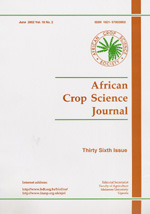
|
African Crop Science Journal
African Crop Science Society
ISSN: 1021-9730
EISSN: 1021-9730
Vol. 29, No. 2, 2021, pp. 177-191
|
 Bioline Code: cs21012
Bioline Code: cs21012
Full paper language: English
Document type: Research Article
Document available free of charge
|
|
|
African Crop Science Journal, Vol. 29, No. 2, 2021, pp. 177-191
| fr |
Odo, I.C. & Akaneme, F.I.
Résumé
L’arachide de Kersting (Macrotyloma geocarpa) est une culture orpheline alimentaire et de revenus significatives des ménages en Afrique Subsaharienne. L’objectif de cette étude était d’évaluer la variabilité chromosomique parmi les accessions de l’espèce en utilisant les analyses des caryotypes. Les six accessions ont été soumises à des techniques cytologiques conventionnelles en utilisant des méristèmes de la pointe des racines. Le nombre de chromosomes somatiques était de 2n = 20 dans toutes les accessions. La longueur totale de chromosome la plus élevée a été obtenue en Tkg 1 (1,739 + 0,047); tandis que le moins était en Tkg 12 (1,014 + 0,029). Toutes les accessions avaient des chromosomes métacentriques, submétacentriques et subtélocentriques. Cependant, il y avait une prépondérance de chromosomes métacentriques, suggérant un caryotype symétrique qui est connu pour être une condition primitive. Cinq des accessions ont été regroupées dans le caryotype 2A tandis qu’une accession, Tkg 9 a été regroupée dans le caryotype 2B. Les caryotypes 2B sont connus pour avoir une plus grande asymétrie chromosomique que 2A; ainsi Tkg 9 peut évoluer plus vite que les autres accessions. L’analyse hiérarchique des clusters a placé les accessions en trois clusters. Groupe 1 composé de quatre accessions (Tkg 1, Tkg 6, Tkg 9 et Tkg 11); tandis que le groupe 2 comprenait une accession (Tkg 6); et le groupe 3 avait une accession (Tkg 12). On a observé que les Tkg 6 et Tkg 12 étaient éloignées des autres accessions; en tant que tel pourrait servir de parents dans les programmes d’hybridation pour générer une plus grande variabilité pour l’amélioration de l’espèce.
Mots Clés
Chromosome; hybridation; Macrotyloma geocarpa; métacentrique
|
| |
| en |
Karyotypic analyses of accessions of Kersting’s groundnut
Odo, I.C. & Akaneme, F.I.
Abstract
Kersting’s groundnut (Macrotyloma geocarpa) is an orphan crop of significant food and household income in sub-Saharan Africa. The objective of this study was to evaluate the chromosomal variability among the accessions of the species through analysis of the karyotypes. Six accessions of Kersting’s groundnut were subjected to conventional cytological techniques, using root tip meristems. The somatic chromosome number was 2n = 20 in all the accessions. The highest total chromosome length was obtained in Tkg 1 (1.739±0.047); while the least was in Tkg 12 (1.014±0.029). All the accessions had metacentric, submetacentric and subtelocentric chromosomes. However, there was a preponderance towards metacentric chromosomes, suggesting a symmetrical karyotype, which is known to be a primitive condition. Five of the accessions were grouped in karyotype 2A while one accession, Tkg 9 was grouped in karyotype 2B. The 2B karyotypes are known to have greater chromosomal asymmetry than 2A; thus Tkg 9 may be advancing evolutionarily faster than the other accessions. Hierarchical cluster analysis divided the accessions into three clusters. Cluster 1 comprised of four accessions (Tkg 1, Tkg 6, Tkg 9 and Tkg 11); while Cluster 2 comprised of one accession (Tkg 6); and cluster 3 had one accession (Tkg 12). Tkg 6 and Tkg 12 were observed to be distantly related to the other accessions; as such could serve as parents in hybridisation programmes to generate wider variability for the improvement of the species.
Keywords
Chromosome; hybridisation; Macrotyloma geocarpa; Metacentric
|
| |
© Copyright 2021 - African Crop Science Society
|
|
